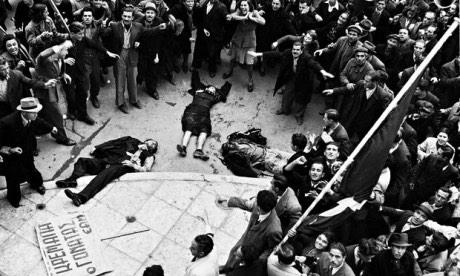The remainder of the Trotskyist delusion that was burdening us and that we had not yet denounced was the idea that Stalinist parties had become bourgeois, just as 40 or 50 years ago, reformist Social Democracy had become bourgeois.
The hour of truth came in December, 1944. What kind of bourgeois or reformist party was this, that -- were we to set aside the dark and not entirely known story of the hesitations and stupidity with which the Stalinist leadership fought the battle of Athens -- was trying to take power by force of arms, slaughtered everyone and everything, etc? And what was it that mobilized the masses following it? It was at this point that the only political disagreement I ever had with Spiros [Stinas; major Trotskyist and anti-KKE militant] occured.
Maybe it was so he could salvage something out of the classical theoretical schema, maybe because the situation for someone bred in Marxism was monstrously incomprehensible, maybe because the situation was tragic -- seeing the little people come downtown from Kaisariani, from Pagkrati, from Peristeri, and being ready to die, and knowing that what they are dying for is the creation of concentration camps and a Stalinist dictatorship. At any rate, for one of these reasons, after December Spiros argued for a certain while --I don't know if the text in question is extant-- that this was an idiosyncratic military movement that echoed the dictatorial tendencies of the military personnel of ELAS. For me, on the contrary, as I have written anyway, the December events were, in a way, the Revelation, not of John, but of Joseph...and of ... Nicolai. These events, the politics of the party, the stance of the masses, were totally indigestible by classical theoretical schemata -- not only Trotskyist, but not even Leninist, and even, were we to be precise, Marxist schemata of viewing society and history. They showed where Stalinism was heading; it was clear as daylight that, had the Stalinists taken power, they would have installed a purely Stalinist regime like the one in Russia, and would have sooner or later purged the bourgeois and the petit bourgeois and the left-wing dissidents, as well as anyone who did not become their servile subject. This, of course, and I say this without arrogance, was corroborated en masse by what happened later (we didn't know it then) in Yugoslavia and in other countries, whether there was a Russian army or not; simply by virtue of the power of Stalinist parties, which of course, in conditions of military conquest and occupation, in conditions of national liberation struggle developed, as they later did in other countries (Vietnam and elsewhere), a gigantic military machine, on which they based themselves to take power.
Speech at the Athens Law School, 1989.
Translated by Lenin Reloaded.
We recruited some people. It was called New Times--New Era, rather. And then as time passed, it turned out that the Greek CP’s attitude was not a deviation but instead was following the line of the Third International--which, moreover, was disbanded soon thereafter (1943) by Stalin. Practically everyone abandoned us and left for the CP. And for my part, I joined the Greek Trotskyist party, the most left-wing faction, directed at the time by an extraordinary man named Spiros Stinas, who died a little less than two years ago--a hero and at the same time a secular saint, who was persecuted his whole life long and who surely almost never ate a hot meal for twenty years. I was active with them until the end of my stay in Greece, that is to say, until the end of ’45, and I never had any differences with Stinas, except on the occasion of the Stalinist coup d’état of December ’44--he thought that it was a military coup d’état, which in my view was meaningless; I, on the contrary, thought, not to go into details, that this attempt at a coup d’état was aimed at establishing [instaurer] in Greece what would later be called a people’s democracy, that is to say, the seizure of power by the Stalinists in order to establish a Russian-type society, with, of course, the necessary local variations.
Interview at Agora International, 1990.
Brief biographical information on Cornelius Castoriades: A year after the events of December 1944, Cornelius Castoriades left Greece on board of the British ship "Mataroa", for Paris. He was quickly hired by the OECD. Most Greeks today think that he left because he was an ultra-revolutionary.
On his connections with Raymond Aron and other figures of the "anticommunist left", as well as the fascist Boris Souvarine, consult:
On his connections with Raymond Aron and other figures of the "anticommunist left", as well as the fascist Boris Souvarine, consult:
Christophe Premat
Annie Lacroix-Riz
Benoit Challand

No comments:
Post a Comment